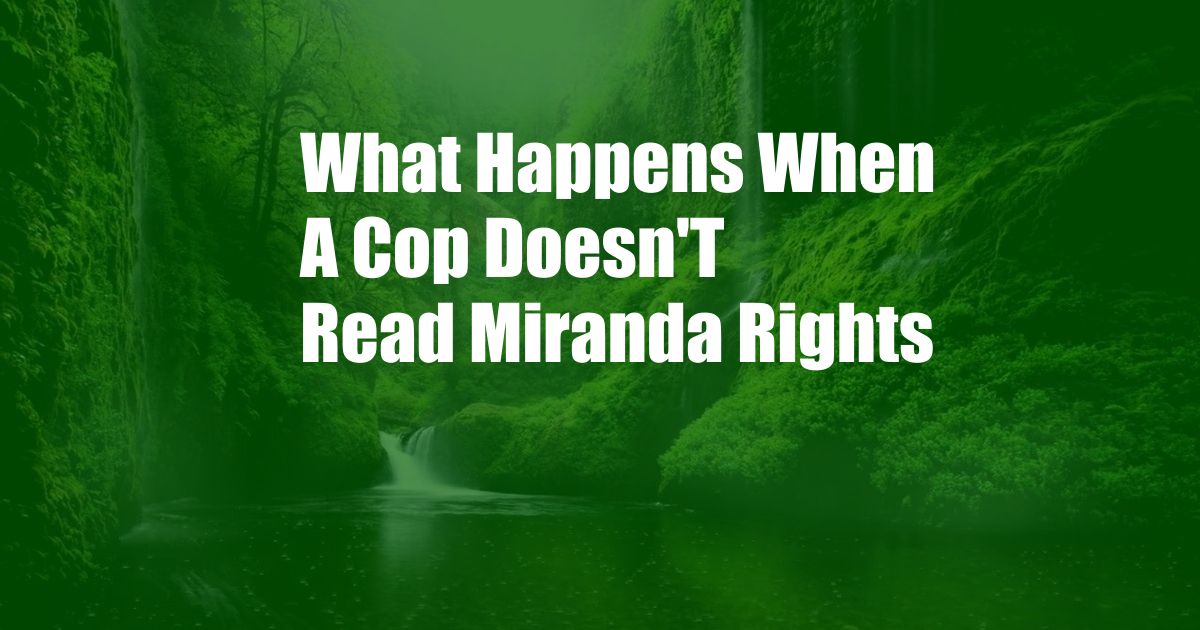
What Happens When a Cop Doesn’t Read Miranda Rights?
Imagine you’re driving home from work when you get pulled over for a broken taillight. You answer the officer’s questions politely, but suddenly, the situation takes a turn. You’re handcuffed, and you hear the sound of clicks as your hands snap against your wrists. The officer leads you to the back of their squad car and reads you your Miranda rights, which you stumble to understand as your mind races. But what if, in the heat of the moment, the officer had forgotten to read you your rights?
Miranda Rights: The Foundation of Due Process
Miranda rights, named after the landmark Supreme Court case Miranda v. Arizona, are a set of specific warnings that law enforcement officers must give to suspects who are being interrogated or arrested. These rights include the right to remain silent, the right to an attorney, and the right to have an attorney present during questioning. Miranda rights are designed to protect suspects from self-incrimination and ensure their due process rights under the Fifth and Sixth Amendments.
Consequences of Failing to Read Miranda Rights
If a police officer fails to read Miranda rights to a suspect before interrogating them, any statements made by the suspect during that interrogation may be suppressed, or thrown out, in court. This is because statements obtained in violation of Miranda rights are considered involuntary and therefore inadmissible. Suppressing these statements can significantly weaken the prosecution’s case and may even lead to charges being dropped.
Exceptions to the Miranda Rule
While Miranda rights are generally required before any custodial interrogation, there are a few exceptions. These exceptions include:
- Public safety exceptions, where there is an immediate threat to the safety of the officer or others.
- Emergency situations, where there is imminent danger to life or property.
- Consent, where the suspect voluntarily waives their Miranda rights and consents to questioning.
Implications for Criminal Cases
The consequences of failing to read Miranda rights can have a major impact on criminal cases. In addition to the suppression of statements, other evidence obtained as a result of the interrogation may also be suppressed. This can weaken the prosecution’s case, make it more difficult to convict the defendant, or even lead to the dismissal of charges.
Protecting Your Rights: Tips from an Expert
As a former law enforcement officer and legal expert, I strongly advise anyone who is arrested or questioned by the police to assert their Miranda rights immediately. Remember that you have the right to remain silent and the right to an attorney. Exercise these rights to protect yourself from making incriminating statements or waiving your constitutional protections.
Frequently Asked Questions (FAQs)
Q: What should I do if the police officer does not read me my Miranda rights?
A: Politely remind the officer that you are entitled to your Miranda rights and that you wish to exercise them. If the officer refuses, remain silent and request an attorney.
Q: Can the police still arrest me even if they don’t read me my Miranda rights?
A: Yes, the police can still arrest you even without reading you your Miranda rights. However, any statements you make during the arrest or subsequent interrogation may not be used against you in court.
Q: Can the police trick me into waiving my Miranda rights?
A: No, the police cannot trick you into waiving your Miranda rights. Any waiver must be voluntary and knowing.
Q: What happens if I waive my Miranda rights and later decide I want them back?
A: Once you waive your Miranda rights, you cannot withdraw them until the interrogation is stopped.
Conclusion
Miranda rights are vital protections for individuals accused of crimes. Failing to read a suspect their Miranda rights can have serious consequences, including the suppression of evidence and the dismissal of charges. As such, it is crucial that law enforcement officers are diligent in adhering to Miranda requirements.
Are you interested in learning more about your Miranda rights or other aspects of criminal defense? Visit our website for more information and resources.